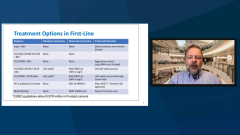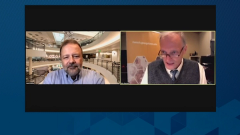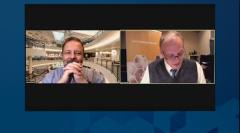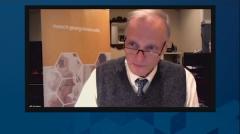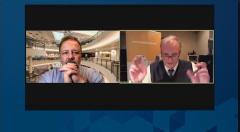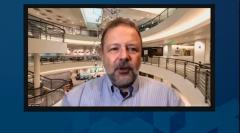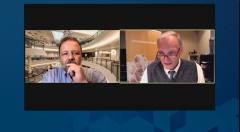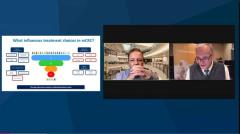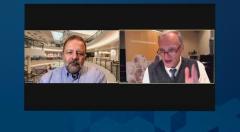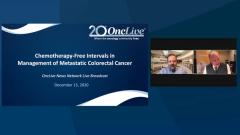
Regorafenib in Third or Fourth Line for mCRC: Safety in the Re-DOS Trial
Axel Grothey, MD, and John Marshall, MD, discuss safety results from the ReDOS study of regorafenib in patients with mCRC.
Episodes in this series

John Marshall, MD: It wasn’t necessarily less toxicity. A little less toxic but not dramatically. That’s because frankly it was dosed to toxicity, it’s just how you got there, right? Did you inch your way up and find your dose? Or did you have such bad toxicity early on that you withdrew?
This doesn’t surprise me and as I’ve gotten smarter, certainly my patients’ hand-foot reaction is much lower. We’re watching it very closely. There aren’t very many people on 160 mg of regorafenib, but there are some. Most of them tend to end up around 120 mg in my experience, but some even at 80 mg in the chronic therapy.
But these are the ones when you can find this dose who will be that curve where 6 months later they’re still stable disease on a decent dose that they can live with day in and day out. What’s your reaction on this?
Axel Grothey, MD: I could not agree with you more. A couple of things. First of all I look at REGO [regorafenib] as a cytostatic agent. Where again, we mentioned this before, it’s not a drug that can induce a lot of response. Whenever you have a cytostatic agent, more than for a cytotoxic agent, I believe, duration of therapy matters. While we know VEGF inhibition beyond progression delaying; and regorafenib is also a VEGF inhibitor, to some degree. But as you said, we don’t even know exactly how it works. It’s probably a signature effect in each individual patient that could be different.
But cytostatic agents benefit from duration of therapy. One of the goals of ReDOS, the study you just mentioned, was to optimize longer duration of treatment. This is what we saw, why the higher likelihood of patients moving into cycle 3 eventually also translated into trend toward improved survival.
And 9.8 months, that’s 3.8 months better, or more than 3 months better than what we’ve seen in the initial CORRECT study, which also shows we are better in patient selection nowadays. We treat patients better. We keep patients on therapy better.
One other point. When you talk about hazard ratios and survival and what can regorafenib really do; even with the older data from CORRECT. The way I communicate with those patients to see what can I expect in terms of outcomes is, “OK, we’ll do the 2 cycles of therapy, 8 weeks of treatment, find a way to get you to the first scan, toxicity management, ReDOS dosing, etc. And you have an almost 50/50 chance to not have progression of the disease, because that’s where curves split.
If you don’t have progression of disease at the scan, based on the data we have, you have a 50% chance to be alive a year from now, a year later. That is I think meaningful because now a year is another birthday, is another holiday.
Transcript Edited for Clarity


